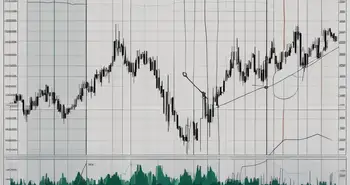Factors That Affect Oil Prices

As an expert in the field, I understand the intricacies of oil pricing and the various factors that influence it. In this article, we will delve into the key elements that drive oil prices, including the basics of oil pricing, political influences, economic factors, environmental considerations, and technological advancements. By the end, you will have a comprehensive understanding of the complex web of influences that impact oil prices.
Understanding the Basics of Oil Pricing
When it comes to oil pricing, two factors play a crucial role: supply and demand. The law of supply and demand dictates that as demand rises and supply diminishes, prices soar. Conversely, when demand weakens or supply surpasses expectations, prices tend to drop. This delicate balance is the heart of oil pricing dynamics.
Furthermore, global markets have a significant impact on oil pricing. As various nations compete for resources, the interplay between countries becomes a driving force behind pricing fluctuations. Geopolitical tensions, conflicts, and trade dynamics can all sway oil prices in one direction or another.
It's essential to consider the role of OPEC (Organization of the Petroleum Exporting Countries) in oil pricing. OPEC is a powerful alliance of oil-producing nations that collectively influence global oil prices through production quotas and policies. Their decisions can have a profound impact on the supply side of the oil market, leading to price shifts that reverberate across the world.
Moreover, technological advancements in oil extraction have transformed the industry. The rise of shale oil production in the United States, for example, has added a new dimension to the supply side of the market. This increased supply capacity has not only influenced prices but has also altered the traditional dynamics of global oil trade.
Political Influences on Oil Prices
International relations and geopolitical tensions are crucial factors affecting oil prices. Any disruption in diplomatic relations or conflicts between major oil-producing nations can significantly impact prices. For example, conflicts in the Middle East often cause oil prices to skyrocket due to concerns over supply disruptions. Similarly, trade policies and regulations implemented by governments can also influence oil pricing.
It is important to note that in addition to geopolitical factors, economic conditions and market speculation play a significant role in determining oil prices. Economic indicators such as GDP growth, inflation rates, and unemployment levels can all impact the demand for oil, thus affecting its price. Furthermore, market speculation, driven by factors such as weather events, technological advancements, and global economic trends, can lead to price volatility in the oil market.
From a personal standpoint, I recall a time when tensions escalated between two major oil-producing nations, causing prices to spike almost overnight. The ripple effect was felt worldwide, resulting in increased fuel costs, transportation expenses, and inflationary pressures.
Economic Factors Impacting Oil Prices
Economic factors, such as inflation and currency value, play an instrumental role in determining oil prices. Inflation erodes purchasing power and can lead to increased costs for oil producers, ultimately impacting prices. Moreover, the strength or weakness of global economies can significantly affect oil demand, subsequently influencing prices. For instance, during a period of economic growth, oil demand tends to rise as industries expand and consumer spending increases.
Considering the current state of the global economy, it is essential for businesses and individuals alike to monitor economic indicators and make informed decisions regarding oil consumption. As an expert, my advice would be to assess macroeconomic trends and adjust strategies accordingly to mitigate potential risks associated with oil price fluctuations.
Another crucial economic factor that impacts oil prices is geopolitical instability. Political tensions in oil-producing regions can disrupt supply chains and lead to price spikes. For example, conflicts in the Middle East have historically caused oil prices to surge due to concerns over supply disruptions. Geopolitical events like trade disputes and sanctions can also create uncertainty in the oil market, influencing prices in the process.
Furthermore, technological advancements in the energy sector can have a profound effect on oil prices. The development of renewable energy sources and improvements in energy efficiency can reduce the demand for oil, putting downward pressure on prices. Innovations in extraction techniques, such as fracking, have also altered the dynamics of the oil market by increasing supply and potentially lowering prices.
Environmental Factors and Oil Prices
In recent years, environmental considerations have become increasingly influential in the oil industry. Climate change concerns have led to a global push for renewable energy sources. As the world shifts toward greener alternatives, the demand for oil may inevitably decline, driving prices downwards. Additionally, natural disasters can wreak havoc on oil production and infrastructure, impacting supply and consequently influencing prices.
Being cognizant of the environmental impact of oil production is crucial, not only for the planet but also for economic stability. As technological advancements continue to pave the way for sustainable energy solutions, diversifying energy sources and embracing renewable alternatives is not just a moral imperative but also a strategic move.
Moreover, geopolitical tensions play a significant role in shaping oil prices. Conflicts in oil-rich regions can disrupt production and transportation, leading to price fluctuations. The political landscape, trade agreements, and sanctions imposed on oil-producing countries all contribute to the volatility of oil prices. Investors closely monitor these geopolitical factors to anticipate market movements and make informed decisions.
Furthermore, the emergence of electric vehicles (EVs) has introduced a new dynamic to the relationship between environmental factors and oil prices. The increasing adoption of EVs is reducing the reliance on traditional combustion engine vehicles, which in turn affects the demand for oil. This shift in consumer preferences towards cleaner transportation options is reshaping the energy sector and forcing oil companies to adapt their business models to stay competitive in a changing market.
Technological Advancements and Oil Prices
The rise of renewable energy sources poses a challenge to the oil industry, compelling companies to adapt and innovate. The advancements in renewable technologies are making alternative energy sources increasingly competitive, potentially leading to reduced oil demand and subsequently lower prices.
At the same time, technology is playing a pivotal role in oil extraction and processing. Innovations in drilling techniques, such as hydraulic fracturing, have significantly increased oil production capabilities. The improved efficiency and cost-effectiveness of these technologies help stabilize oil prices by ensuring a steady supply.
As an expert in the field, I have witnessed firsthand the transformative impact of technology on the oil industry. I recall an instance where a breakthrough in extraction techniques led to a surge in oil production, mitigating concerns over scarcity and prompting a decline in prices.
Furthermore, the integration of artificial intelligence (AI) and big data analytics has revolutionized the way oil companies operate. AI algorithms are now used to optimize drilling processes, predict equipment maintenance needs, and enhance overall operational efficiency. This not only reduces costs for oil companies but also contributes to a more sustainable and environmentally conscious approach to oil extraction.
In addition to technological advancements in extraction methods, the transportation and distribution of oil have also seen significant improvements. The development of advanced pipeline monitoring systems and automated delivery mechanisms has streamlined the logistics involved in the oil supply chain, ensuring a more reliable and secure distribution network.
FAQ
Q: What are the main factors that affect oil prices?
A: The main factors that influence oil prices include supply and demand dynamics, geopolitical tensions, economic indicators, environmental considerations, and technological advancements.
Q: How do geopolitical tensions impact oil prices?
A: Geopolitical tensions, such as conflicts between oil-producing nations or disruptions in diplomatic relations, can lead to supply disruptions and, subsequently, higher oil prices.
Q: Are environmental factors affecting oil prices?
A: Yes, environmental factors, such as climate change concerns and natural disasters, can impact oil prices. The push for renewable energy sources and the potential decline in oil demand as a result can lead to lower prices in the long term.
Q: How do technological advancements influence oil prices?
A: Technological advancements play a dual role. On one hand, the rise of renewable energy technologies can decrease oil demand and potentially lower prices. On the other hand, innovations in oil extraction and processing help stabilize prices by ensuring a steady supply.
However, it is important to note that the factors influencing oil prices are not static. They are constantly evolving and interacting with one another in complex ways. For example, let's delve deeper into the supply and demand dynamics. The global demand for oil is heavily influenced by economic growth, population trends, and industrial development. As economies expand and populations increase, the demand for oil rises, putting upward pressure on prices. Conversely, during periods of economic downturn or reduced industrial activity, the demand for oil may decline, leading to lower prices.
Moreover, supply disruptions can have a significant impact on oil prices. These disruptions can occur due to various reasons, such as natural disasters, political unrest, or infrastructure failures. In recent years, we have witnessed the effects of hurricanes, political conflicts, and pipeline leaks on oil supply. These events can disrupt production and transportation, causing a temporary reduction in supply and driving prices higher.
Another important factor to consider is the role of speculators in the oil market. Speculators are individuals or entities that trade oil futures contracts with the aim of profiting from price fluctuations. Their activities can introduce additional volatility to oil prices, as they make bets on future price movements based on various factors, including geopolitical events, economic data, and market sentiment.
In conclusion, oil prices are influenced by a multitude of factors, ranging from supply and demand dynamics to political influences, economic indicators, environmental considerations, technological advancements, and the activities of speculators. As an expert, I recognize the need for a comprehensive understanding of these factors to navigate the ever-changing landscape of the oil market. By staying informed and adaptable, individuals and businesses can mitigate risks and make informed decisions that align with their goals and values.
Understanding the factors that affect oil prices is crucial for making informed trading decisions. With Morpher, you can leverage these insights on a revolutionary trading platform that offers zero fees, infinite liquidity, and the ability to trade a wide range of assets, including oil. Whether you're looking to invest in fractional shares or take advantage of 10x leverage, Morpher provides a unique and flexible trading experience. Sign up now to experience the future of trading and receive your Free Sign Up Bonus.

Disclaimer: All investments involve risk, and the past performance of a security, industry, sector, market, financial product, trading strategy, or individual’s trading does not guarantee future results or returns. Investors are fully responsible for any investment decisions they make. Such decisions should be based solely on an evaluation of their financial circumstances, investment objectives, risk tolerance, and liquidity needs. This post does not constitute investment advice.

Painless trading for everyone
Hundreds of markets all in one place - Apple, Bitcoin, Gold, Watches, NFTs, Sneakers and so much more.

Painless trading for everyone
Hundreds of markets all in one place - Apple, Bitcoin, Gold, Watches, NFTs, Sneakers and so much more.









